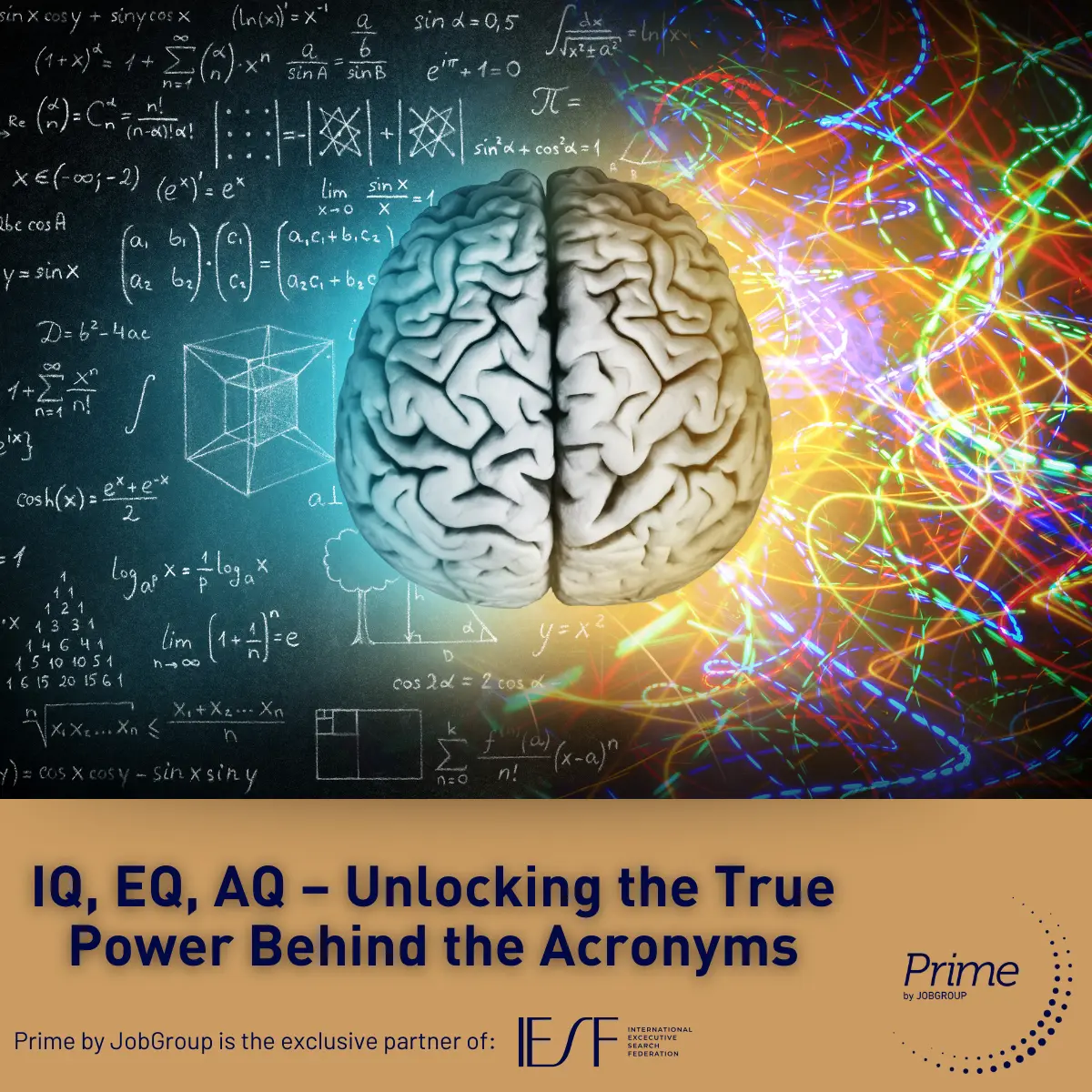For those who has experience in leadership or in human resources, it’s common to encounter new acronyms representing competencies from time to time. Beyond technical expertise, personal skills and competencies — whether measurable or intangible — play a key role in filling management roles. Among these, IQ (intelligence quotient) is a familiar metric, though it’s rarely used in isolation anymore. In the past 7–8 years, EQ (emotional intelligence quotient) has gained traction, and for good reason. More recently, the VUCA (Volatile, Uncertain, Complex, and Ambiguous) world we now inhabit, alongside the aftermath of the pandemic, has underscored the importance of AQ (adaptability quotient) as an equally, if not more, essential measure of managerial competence. AQ may not be a new concept, but it is increasingly vital for effective, sustainable leadership.
This article explores how IQ, EQ, and AQ contribute to effective leadership and how they factor into leader selection.
IQ has long been a measure of cognitive ability, encompassing:
- Cognitive and verbal abilities
- Short-term memory
- Visual and intellectual skills
- Problem-solving
- Openness to innovation
Though initially viewed as an indicator of success, research results are mixed. British psychologist Liam Hudson, for instance, found that while individuals with below-average IQs tend to perform less effectively, there’s little difference in performance between individuals with high IQs. However, IQ does correlate with academic achievement, with those holding advanced degrees often possessing higher IQs. Yet in the professional world, IQ alone is insufficient; it primarily indicates whether someone is “smart” enough to build a foundation for success through education, not necessarily whether they will excel as a professional or leader.
If IQ isn’t the key differentiator, what is? In the 1970s, EQ began drawing attention in scientific and psychological circles. In the 1980s, Harvard psychologist Howard Gardner incorporated EQ into his widely recognized model of intelligence. Like IQ, EQ is measured through assessments but focuses on emotional competencies, such as the ability to perceive, manage, and positively influence emotions.
Daniel Goleman, a leading researcher on emotional intelligence, identified five key components of EQ:
1. Self-awareness: Understanding one’s own emotions, thoughts, and actions.
2. Self-regulation: The ability to manage emotions, exercising control over negative impulses.
3. Motivation: The skill of maintaining a productive mindset, tied closely to success and intrinsic motivations such as growth and progress.
4. Empathy: The ability to perceive and respond to others’ emotions.
5. Social skills: The ability to build and sustain positive social relationships.
These skills form the foundation of effective leadership. Goleman argues that “truly effective leaders are distinguished by a high degree of emotional intelligence,” as a high IQ alone is insufficient. Research by Cotrus et al. (2012) further suggests that emotional intelligence accounts for 80% of workplace success, though this claim is often debated. Despite criticism, it’s widely accepted that both cognitive and emotional skills contribute to successful leadership.
AQ gauges adaptability, a trait that’s grown increasingly relevant in recent years. Originally applied to companies, AQ has shifted to individuals, particularly in assessing resilience in challenging situations. The road to success is rarely smooth, making adaptability crucial for long-term achievement.
Elements of AQ include:
- Attitude and mental stress management
- Strategic thinking
- Learning and adapting to new environments
- Perseverance and crisis management
AQ, which overlaps with resilience, helps individuals bounce back from setbacks. Resilient people face challenges with a mindset geared toward learning and improvement, quickly returning to “equilibrium growth” after difficulties. As a core leadership skill, AQ enables individuals to fully leverage their cognitive and emotional abilities, helping pave the way for personal and professional development.
Effective leaders possess knowledge in their fields, stay informed on industry developments, and engage their teams with empathy, open-mindedness, and resilience. They inspire, adapt to change, and face challenges head-on. Many of these attributes align with IQ, EQ, and AQ. Studies suggest that IQ contributes 20% to long-term success, with EQ and AQ each accounting for 40%.
Yet, measuring these traits remains a challenge, and they don’t always translate directly to workplace settings. Leadership selection requires a nuanced approach that goes beyond tests, relying on experience, intuition, and people skills. Often, companies turn to headhunters or HR consultants for this purpose. JobGroup Prime’s executive search consultants bring years of experience, ensuring they match candidates who align with the company’s culture, goals, and mission.
In an ever-changing business world, the importance of CQ (creative quotient) and SQ (spiritual quotient) is also rising. PQ (physical quotient) is another emerging factor, as physical wellness increasingly influences mental health and overall resilience.
As experts in shaping the future workforce, we recognize the importance of nurturing IQ, EQ, and AQ in children from an early age. Through everyday challenges, children naturally develop adaptability, resilience, and empathy. When praising children, it’s beneficial to focus on their effort rather than their innate qualities. Encouraging diligence fosters intrinsic motivation, laying the groundwork for their long-term personal and collaborative growth.
